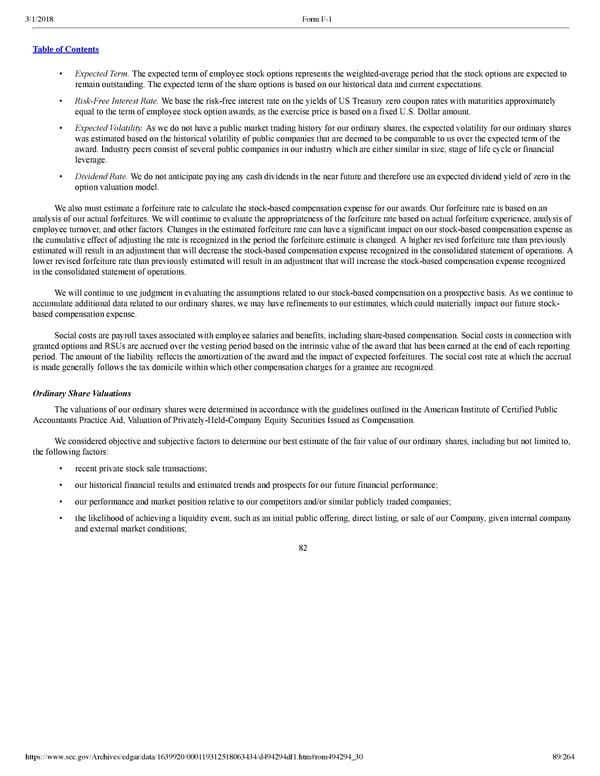89/264 • Expected Term. The expected term of employee stock options represents the weightedaverage period that the stock options are expected to remain outstanding. The expected term of the share options is based on our historical data and current expectations. • RiskFree Interest Rate. We base the riskfree interest rate on the yields of US Treasury zero coupon rates with maturities approximately equal to the term of employee stock option awards, as the exercise price is based on a fixed U.S. Dollar amount. • Expected Volatility. As we do not have a public market trading history for our ordinary shares, the expected volatility for our ordinary shares was estimated based on the historical volatility of public companies that are deemed to be comparable to us over the expected term of the award. Industry peers consist of several public companies in our industry which are either similar in size, stage of life cycle or financial leverage. • Dividend Rate. We do not anticipate paying any cash dividends in the near future and therefore use an expected dividend yield of zero in the option valuation model. We also must estimate a forfeiture rate to calculate the stockbased compensation expense for our awards. Our forfeiture rate is based on an analysis of our actual forfeitures. We will continue to evaluate the appropriateness of the forfeiture rate based on actual forfeiture experience, analysis of employee turnover, and other factors. Changes in the estimated forfeiture rate can have a significant impact on our stockbased compensation expense as the cumulative effect of adjusting the rate is recognized in the period the forfeiture estimate is changed. A higher revised forfeiture rate than previously estimated will result in an adjustment that will decrease the stockbased compensation expense recognized in the consolidated statement of operations. A lower revised forfeiture rate than previously estimated will result in an adjustment that will increase the stockbased compensation expense recognized in the consolidated statement of operations. We will continue to use judgment in evaluating the assumptions related to our stockbased compensation on a prospective basis. As we continue to accumulate additional data related to our ordinary shares, we may have refinements to our estimates, which could materially impact our future stock based compensation expense. Social costs are payroll taxes associated with employee salaries and benefits, including sharebased compensation. Social costs in connection with granted options and RSUs are accrued over the vesting period based on the intrinsic value of the award that has been earned at the end of each reporting period. The amount of the liability reflects the amortization of the award and the impact of expected forfeitures. The social cost rate at which the accrual is made generally follows the tax domicile within which other compensation charges for a grantee are recognized. Ordinary Share Valuations The valuations of our ordinary shares were determined in accordance with the guidelines outlined in the American Institute of Certified Public Accountants Practice Aid, Valuation of PrivatelyHeldCompany Equity Securities Issued as Compensation. We considered objective and subjective factors to determine our best estimate of the fair value of our ordinary shares, including but not limited to, the following factors: • recent private stock sale transactions; • our historical financial results and estimated trends and prospects for our future financial performance; • our performance and market position relative to our competitors and/or similar publicly traded companies; • the likelihood of achieving a liquidity event, such as an initial public offering, direct listing, or sale of our Company, given internal company and external market conditions; 82
 Spotify F1 | Interactive Prospectus Page 88 Page 90
Spotify F1 | Interactive Prospectus Page 88 Page 90